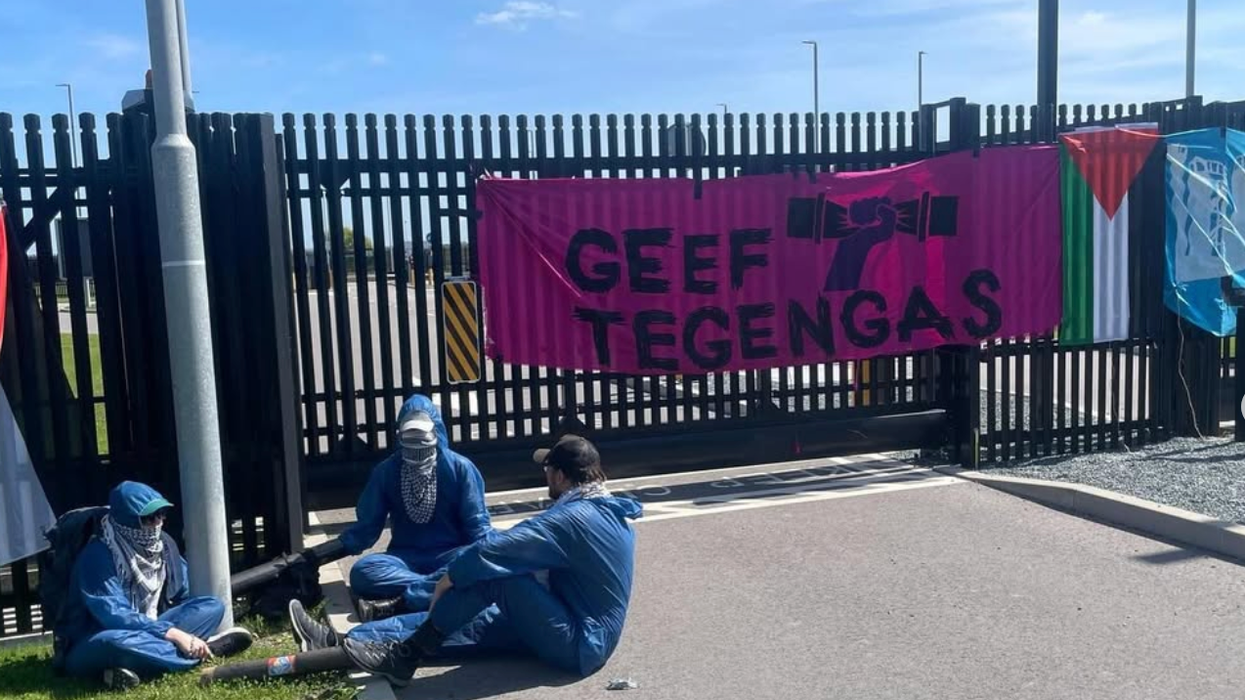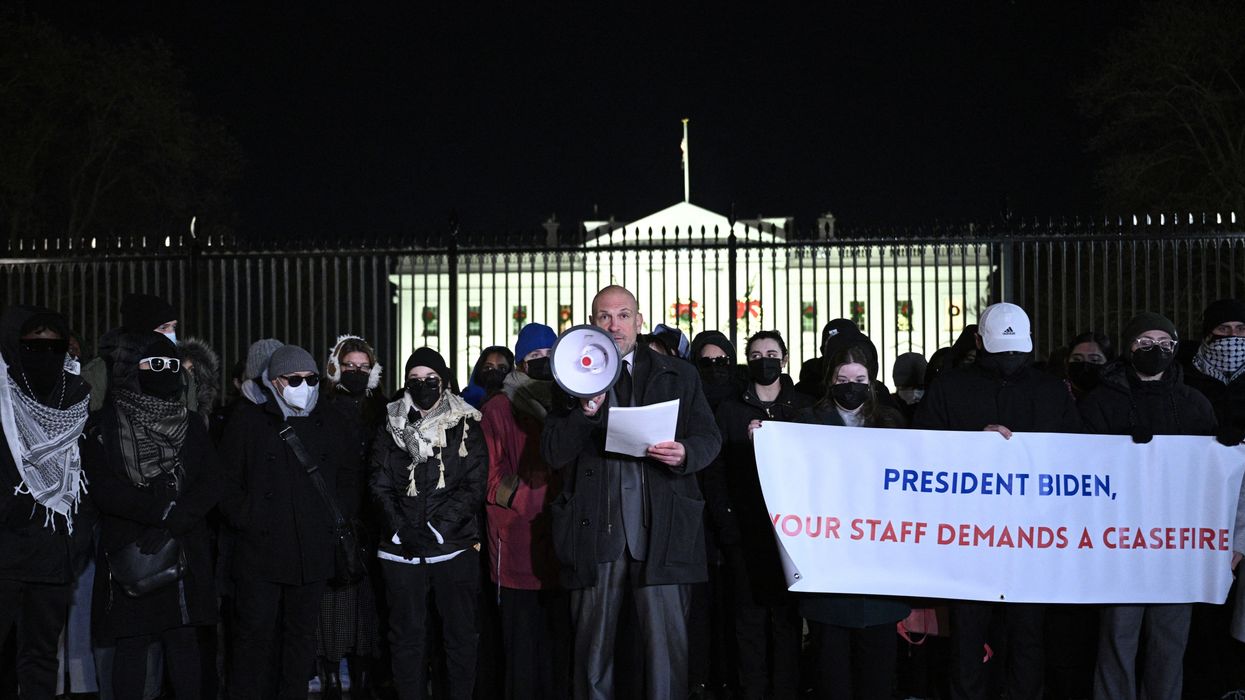Protesters Target Dutch Microsoft Data Center for 'Genocidal Collaboration' With IDF
"Microsoft stores thousands of terabytes of surveillance data from the Israeli intelligence service Unit 8200—data that is used to oppress, imprison, and murder innocent Palestinians."
Protesters staged a demonstration Sunday at a Microsoft data center in the Netherlands following last week's revelation that the facility is being used by the Israel Defense Forces to plan genocidal airstrikes in Gaza and to store massive amounts of intelligence on Palestinians in the illegally occupied territories.
Members of the direct action group Geef Tegengas (Push Back) led the demonstration at Microsoft's data center near the northwestern city of Middenmeer. Some activists scaled the roof of a building and lit flares, while others locked themselves to poles and blocked an entrance to the facility.
On its Instagram page, Geef Tegengas said it was targeting "genocide in our backyard."
"Microsoft stores thousands of terabytes of surveillance data from the Israeli intelligence service Unit 8200—data that is used to oppress, imprison, and murder innocent Palestinians," the group said. "Thanks to its Azure cloud service, Microsoft plays a direct role in the genocide of the people of Gaza."
Geef Tegengas demanded that Microsoft "remove all Israeli intelligence data" and urged employees at the facility to "lay down your work."
The group also called on people to boycott Microsoft and support the global Boycott, Divestment, and Sanctions movement against Israel.
"We will continue to take action until this genocidal collaboration stops," Geef Tegengas vowed.
Sunday's demonstration followed the publication last week of a joint investigation by The Guardian, +972 Magazine, and Local Call revealing that Unit 8200, the largest unit in the Israel Defense Forces (IDF), is storing 11,500 terabytes of data containing roughly 200 million hours of Palestinians' phone call recordings on the Azure servers in the Netherlands.
According to the investigation—which involved interviews with 11 Microsoft and Israeli intelligence sources and a cache of leaked company documents—former Unit 8200 head Yossi Sariel traveled to Microsoft headquarters in Redmond, Washington in the United States in 2021 to meet CEO Satya Nadella.
Sniffing a lucrative opportunity, Nadella agreed to grant the cyberwarfare unit access to a special area of the Azure cloud platform. The project's goal was storing "a million calls per hour."
An intelligence source said that some of the Microsoft employees involved in the undertaking were Unit 8200 veterans, making collaboration "much easier."
One leaked Microsoft document showed that company leaders embraced the IDF partnership as "an incredibly powerful brand moment."
Microsoft responded to the investigation by claiming that Nadella was unaware of exactly what kind of data Unit 8200 was storing on the company's servers.
Three Unit 8200 sources told The Guardian that Azure has facilitated IDF airstrikes on Gaza, where 674 days of U.S.-backed IDF bombing, invasion, and siege have left at least 229,000 Palestinians dead, maimed, or missing amid a worsening famine and the specter of ethnic cleansing and full Israeli occupation.
Israel's conduct in the war is the subject of an ongoing genocide case at the International Court of Justice in The Hague, Netherlands. The International Criminal Court, also located in the Dutch city, last year issued arrest warrants for Israeli Prime Minister Benjamin Netanyahu and former Defense Minister Yoav Gallant for alleged crimes against humanity and war crimes in Gaza.
Microsoft said Monday that it has launched an investigation into how Unit 8200 is using Azure. This, after the company said in May that an internal review "found no evidence to date that Microsoft's Azure and [artificial intelligence] technologies have been used to target or harm people in the conflict in Gaza."
A Microsoft spokesperson said Monday that the company "takes these allegations seriously, as shown by our previous independent investigation."
"As we receive new information, we're committed to making sure we have a chance to validate any new data and take any needed action," the spokesperson added.
The Guardian reported Monday that the news outlets' investigation prompted debate last week in the Staten-Generaal, the Dutch Parliament, where Christine Teunissen of the left-wing Party for the Animals pressed the government on what it is doing to prevent data stored in the Netherlands from "being used to commit genocide" in Gaza.
Dutch Foreign Minister Caspar Veldkamp replied that he would "request further investigation."
"If there are serious indications of criminal offenses in that information, legal proceedings can of course be initiated, and that is then up to the public prosecution service," he said.
The Guardian/+972 Magazine/Local Call investigation follows last month's revelation by the latter two outlets that the IDF has undertaken a "dramatic increase in the purchase of services from Google Cloud, Amazon's AWS, and Microsoft Azure."
Big Tech's profiteering from Israel's annihilation of Gaza and occupation, settler colonization, and apartheid in the West Bank has sparked numerous protests, including by employees of complicit companies. At least dozens of workers at companies including Google, Meta, and Microsoft have been fired for Palestine advocacy. Others have resigned in protest.
Hossam Nasr, a former Microsoft software engineer, was fired after organizing an October 2024 "No Azure for Apartheid" vigil for Palestinians killed by Israeli forces in Gaza.
Nasr told The Guardian after his termination that he was fired "simply because we were daring to humanize Palestinians, and simply because we were daring to say that Microsoft should not be complicit with an army that is plausibly accused of genocide."


